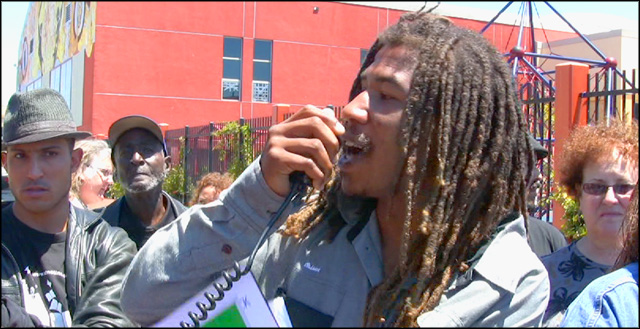In a case that has gained notoriety in San Francsico, Debray Carpenter, also known as Fly Benzo, was convicted Feb. 22 of two misdemeanors.
Benzo was filming the police with his cell phone camera at the time of his arrest. Videos of his arrest are available online.
Video evidence
Benzo was arrested at an Oct. 18 rally. During that incident, police officers John Norment and Joshua Fry of the Bayview precinct apparently unplugged a boombox that they said was not authorized in a street outlet. Then, when officers began videotaping Benzo, he took out his camera phone and began videotaping them as well. Witnesses report that police told Benzo to get the camera “out of my face.”
According to transcripts of three videos of the incident, police told Benzo “back up” and “don’t put your hand in my face.” Benzo claimed his right to stand “where I want to stand” and to film the police. Other individuals near him at the time objected to police orders for Benzo to “stand back,” saying, “he didn’t even touch you though” and asserting that Benzo had done nothing wrong.
After a minute or so of back and forth, Officer Fry stated “Don’t put your hand – You know what? Put your hands behind your back.” At that point, the video shows four officers converging to detain Benzo and knocking him to the ground.
The assault in question occured after Benzo was detained.
“[Benzo] was moving himself from side to side. He didn’t want to get knocked to the ground. During that incident, Officer Fry scraped his elbow and that’s the alleged assault,” said Severa Keith, Benzo’s attorney.
The jury convicted Benzo of misdemeanor assault rather than felony, citing insuffient evidence that Officer Norment had suffered a concussion after the incident.
Trial by jury
Benzo’s trial concluded Feb. 22. The jury found Benzo not guilty of felony assault of a police officer, but did convict him of three misdemeanors. Benzo was convicted of “resisting, obstructing or delaying a peace officer in his or her lawful duties” (California Penal Code Section 148 A1) and misdemeanor assault committed against a peace officer (Section 241 C).
Assistand District Attorney Omid Talai emphasized that “Benzo was convicted by a jury of his peers.” The jury spent four days deliberating the case.
“The jury obviously took this very seriously and went through each element of the defense. They said they’d watched the videos numerous times,” said Talai.
But some supporters have raised doubts about the jury, partly because there were no African American jurors.
“He did not get indicted by a group of his peers,” said Tracey, a comrade of Benzo’s from the Black Star Liner Coalition. The Coalition is a CCSF student club aimed at improving the relationship between the college and its surrounding community.
Benzo has said that he was consistently harassed by police, including Norment and Fry, for several months prior to the incident.
Keith says she had several witnesses ready to testify to this harassment at the trial.
“These officers would sometimes flip him off, there were a couple of officers who would go by him and hold up the black power fist in a mocking way. There was testimony of how these officers had threatened him,” said Keith.
However, prosecutors successfully exluded all evidence concerning previous incidents between Benzo, Norment and Fry with a pre-trial motion
According to Keith, “We had a really good and very thoughtful jury. But they were not given the chance to understand all the aspects of what happened that day.”
She added that jurors were permitted to write questions to ask witnesses, and several jurors used this tool to attempt to ask about previous incidents between the officers and the defendent in order to better understand the motives of all parties. These questions were not answered due to the pre-trial motion.
“A lot of middle class people hear stories about the way that people in poor black neighborhoods experience the police, even on a day to day basis when nothing out of the ordinary had occured, and they don’t believe it because it’s so different form their experiences. Or they don’t want to believe it because they don’t want to believe that people get treated that way, or that police act that way,” said Kieth.
Troubled history
Benzo is known for speaking out against issues of police harassment in the Bayview, including the killing of Kenneth Harding. Harding, 19, was shot by police in August 2011. Harding was leaving a T train when police asked to see his transfer, a two-dollar value. Harding presumably panicked and ran away from the police. Officers shot at him as he ran. Police have claimed that Harding produced a gun and, while running, shot behind himself at police, and that it was his own bullet that killed him.
Police then approached and surrounded the fallen Harding and prevented others from approaching him. After 30 minutes, the young man had bled to death. A video of his death has since circulated widely on youtube.
Harding’s death sparked an upsurge in the continued outrage over police violence and racist disparities in law enforcement tactics.
Many of Benzo’s supporters feel that his convictions impinge on first amendment rights, and feel that the convictions are unjust.
But Benzo, a CCSF student and musician, is also trying to spend time taking care of his life responsibilities.
“[Benzo] is a college student. He’s doing what he needs to do, and going to school,” explained Tracey.
Benzo is scheduled for sentencing April 20, to be decided by Judge Jerome Benson. Each misdemeanor could carry a year in county jail.
Kieth is considering appealing the verdict.

